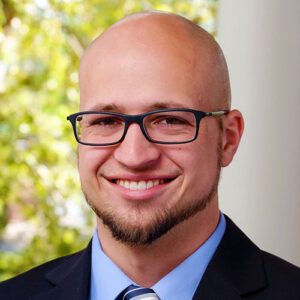5 State-Level Changes that Teachers Should Advocate for
Alfuth: To create the profession of the future, educators must engage with their governors, legislators, state board members and education chiefs

Get stories like this delivered straight to your inbox. Sign up for The 74 Newsletter
I was a high school math teacher for five years, and in many ways, it was one of the most fulfilling jobs I’ve ever had. I daily guided young minds toward new knowledge and watched as my work had an impact on their growth and development.
Yet, I often felt overwhelmed by the number of hats I was asked to wear and my inability to meet my students’ individual academic needs. I saw too many fall further and further behind in a rigid system built for sameness and standardization. I was frustrated and saw this frustration reflected in students as they struggled to excel.
As more and more educators consider leaving the public schools for these very reasons, now is the time for systemic change. Merely patching holes in a failing industrial-era K-12 education model will continue to deliver dismal results. Instead, now is the time to redefine the role of educators and transform their role by equipping them with the strategies needed to engage more meaningfully with their students. This can be accomplished by reorienting school around personalized, competency-based learning.
With this approach, teachers work with students to design learning experiences that empower them to progress toward their individual goals at their own pace. This facilitates a stronger relationship between students and teachers and is having a positive impact on student experience and academic achievement.
Research shows positive impacts of student-centered teaching on both academic performance and engagement. But it also correlates with greater levels of job satisfaction among teachers in higher education. Working with hundreds of educators in dozens of states and schools, the team at KnowledgeWorks has seen first-hand how this approach positively affects teacher morale in K-12.
Educators overwhelmingly say they are ready for systemic change, and they have more power than ever before to shape the future of learning and their profession. With so many teachers leaving the classroom, those who remain have an opportunity to demand more power, compensation and autonomy.
Because so much education policy and politics happens at the state level, it is critically important for educators to engage directly with state leaders and policymakers — governors, legislators, state board members and education chiefs.
Here are a few things educators should advocate for to lay the groundwork for the future they want:
- Prioritize teacher development in a student-centered vision. State policymakers should be encouraged to create a vision for K-12 education that establishes a clear set of expectations for what students should know or be able to do by the time they graduate. This vision can then be integrated into teacher preparation, credentialing, professional development and evaluation systems. For example, Virginia created a Profile of a Virginia Teacher to help educators put the state’s Portrait of a Virginia Graduate into practice in their classrooms. The Council of Chief State School Officers and Jobs for the Future also detailed educator competencies for personalized learning that states could use as a baseline. At least 13 states have similar visions in place, providing examples for other states looking to explore personalized learning possibilities.
- Build capacity for professional learning. State policymakers can rethink professional development, evaluation systems and school leadership programs by creating professional learning communities for educators across the state to share lessons learned. These networks can also be leveraged to disseminate best practices statewide. KnowledgeWorks has helped facilitate these learning networks in states including South Carolina, North Dakota, Arizona and Ohio. Districts could also explore pathways to personalized, competency-based learning by offering microcredentials that acknowledge a specialized skill a teacher has learned. This allows educators to earn points toward demonstrating mastery in personalized-learning classroom practices and can be used to recognize and reward ongoing professional development.
- Incentivize and learn from district innovation. With education innovations taking shape in hundreds of schools and districts across the country, many states have examples of personalized learning and corresponding shifts in educator practice that are ripe for replication. One state, South Carolina, has created inquiry labs that allow schools to achieve this by learning from others.
- Start small. To implement a sustainable shift to personalized, competency-based learning, teacher preparation and professional development programs will need to be reformulated to better equip teachers with the strategies needed to promote competency-based learning. However, state policymakers might first seek to reorient smaller programs around personalized learning practices. For example, many states and districts have established teacher residency programs for aspiring educators where this could occur. Policymakers might also consider dedicating resources or allowing districts to implement teacher residencies oriented around personalized-learning approaches.
- Connect to postsecondary education. States should also consider engaging with the burgeoning postsecondary competency-based education movement to inform their teacher preparation programs. Arizona State University, boasting one of the largest teachers colleges in the country, has been working with KnowledgeWorks over the past 18 months to unveil a personalized, competency-based learning specialization during the next semester.
These are just some ideas for teachers to begin advocating for the transformational changes needed to the nation’s traditional delivery of education. More ideas and state level examples can be found in this short policymakers’ guide, Transforming for Tomorrow.
Now, more than ever, teacher voices are needed to help advocate for the state-level changes that are needed to create a sustainable education system and teaching profession for the future.
Get stories like these delivered straight to your inbox. Sign up for The 74 Newsletter

;)
